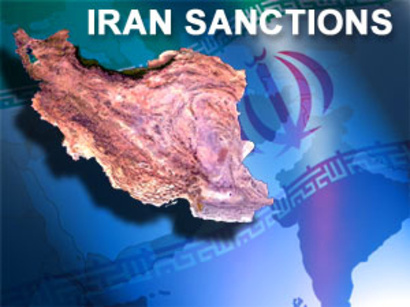Beyond sanctions, Iran squeezed by higher edible oil costs

Iran is having to pay a premium for basic foodstuffs such as
cooking oil, highlighting the increasing strain on Tehran from
Western sanctions aimed at its disputed nuclear programme, even
though the sanctions don't cover food, Reuters reported.
Wilmar International, the world's largest listed planter, and Mewah
International, a $570 million edible oils processor - both listed
in Singapore - are driving sales to Iran on long-term contracts,
with Middle Eastern trading sources reporting premiums of up to $30
a tonne to the cash benchmark.
Food shipments are not targeted under the sanctions, but the
financial squeeze has cut off firms operating in Iran from much of
the global banking system and pushed inflation above 30 percent.
Oil exports, Iran's major source of hard currency, have more than
halved since 2011.
Food exporters largely shun Iranian deals, with a volatile rial
currency deepening risk and foreign banks wary of financing the
food trade for fear of reputational damage.
A shopkeeper in Tehran told Reuters he had put up his price of
imported cooking oil by up to 30 percent this month. A 900
millilitre bottle of cooking oil costs around 39,000 rials ($3.18),
compared to a 1 litre bottle that sells for $3.10 in Britain and
$1.20 in palm oil-producing Malaysia. Another storekeeper said
prices had been stable for weeks.
Iran has shifted to Southeast Asian palm oil as sanctions and
limited supplies have disrupted imports of soybeans and oil from
Argentina. Malaysia, the world's second-largest palm oil producer,
saw exports to Iran jump 60 percent last year to a record 548,603
tonnes - still less than 5 percent of Malaysia's total exports of
about 17 million tonnes.
Wilmar and Mewah dominate the trade with Iran where demand for
high-value refined palm olein, used in cooking oil, can reach
500,000-700,000 tonnes a year. Wilmar sells to Saudi Arabian food
company Savola, which buys palm oil to feed its edible oil
processors in Iran, three Middle Eastern trading sources told
Reuters. They said Wilmar demands a premium of $20-$30 per tonne to
cover potential payment delays and interest charges.
Wilmar said it does not comment on specific contracts. Savola did
not respond to requests for comment.
"Savola is a one woman man. It sticks to one palm oil company to
supply its refineries and it's Wilmar for the past few years," said
a Dubai trading source close to Savola. "Payments can be slow, but
there are ways around it. The money will be banked in (Saudi)
riyals, euros and U.S. dollars from Turkish banks. Sometimes, the
money will come via India."
Mewah last month shipped 75,310 tonnes of palm oil to Iran, its
best month so far this year, shipping documents show.
"Mewah is the go-to person for Iran. It buys the palm oil from
Malaysian firms and then sells it to Iran," said a trading
executive from a Malaysian plantation who deals with Mewah. "They
are established in the Iran trade and have deep pockets to
withstand payment delays."
Planters who have sent cargoes to Iran with Mewah include
subsidiaries of IOI Corp, Kuala Lumpur Kepong and a Malaysian unit
of Wilmar, cargo surveyor documents show. Officials at those
companies declined comment.
Shipping documents obtained by Reuters show Wilmar exported at
least 114,000 tonnes of refined palm oil to Iran from the
Indonesian island of Sumatra alone last year. In January of this
year, Wilmar shipped another 10,700 tonnes to Iran from
Sumatra.
"Wilmar doesn't do high stakes gambling. So it has taken a
corporate guarantee from Savola's head office in Saudi Arabia,"
said a Southeast Asian trading source who has done deals with
Savola. "It's become standard practice."
Savola has 832,000 tonnes of annual capacity in Iran, giving it
nearly 40 percent market share in a country of over 74 million
people. The firm's revenues from Iran increased by almost a third
last year to 4.4 billion riyals ($1.17 billion), about 42 percent
of its global edible oil sales.
Iran is proving more profitable than price-sensitive China, where
competition means Wilmar only profits from refining margins. And
India, the world's top palm oil buyer, has imposed higher import
taxes to stem the flow of cheap refined edible oil from Indonesia
and Malaysia.
With more than half a million hectares of oil palm estates in
Indonesia and Malaysia, Wilmar makes most of its sales, and
profits, from trading with India and China.
"Indonesia is looking for new markets for its refined palm oil.
Iran is a natural choice, it has captive consumers. They
desperately need the oil and they will pay a premium," said a
Singaporean trader, who didn't want to be named as he is not
authorised to speak to the media.
So far this year, shipping records show Mewah has exported 168,100
tonnes of palm oil from Malaysia to ports in Iran. Most cargoes are
taken up by private Iranian buyers though state food procurement
firm GTC is also an occasional buyer, traders said.
"We do come into the palm oil market from time to time to buy.
These are private deals," a GTC official told Reuters from Tehran.
He declined to discuss the deals.
Here we are to serve you with news right now. It does not cost much, but worth your attention.
Choose to support open, independent, quality journalism and subscribe on a monthly basis.
By subscribing to our online newspaper, you can have full digital access to all news, analysis, and much more.
You can also follow AzerNEWS on Twitter @AzerNewsAz or Facebook @AzerNewsNewspaper
Thank you!
